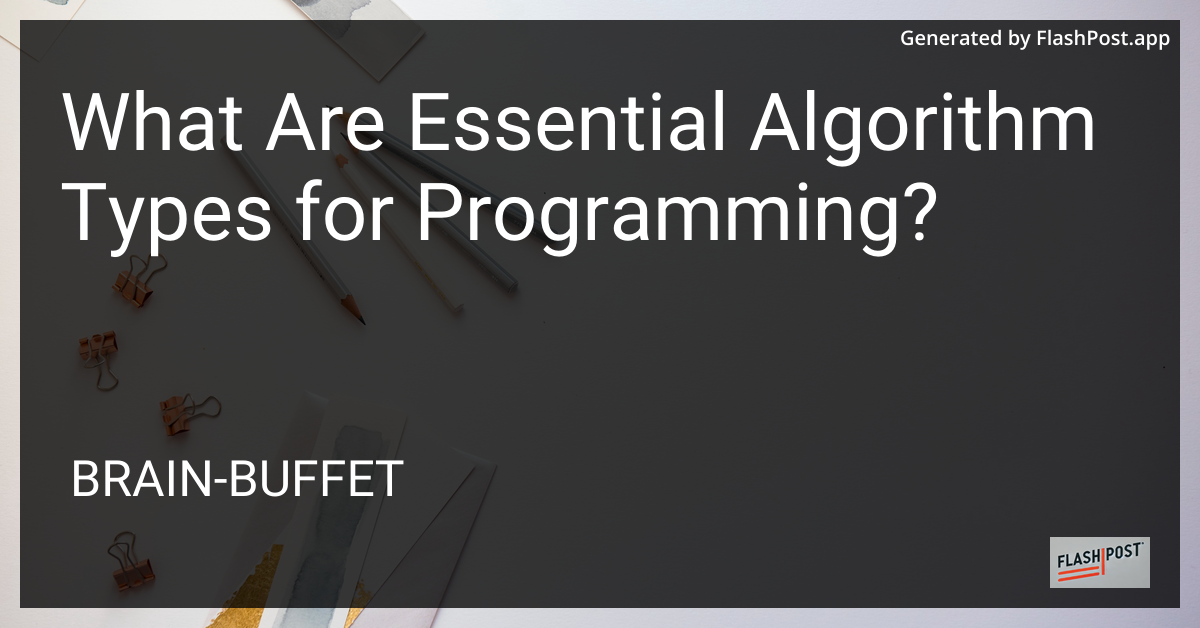What Are Essential Algorithm Types for Programming?

Best Data Structures and Algorithms Book to Buy in 2025
| Product | Features | Price |
|---|---|---|
 A Common-Sense Guide to Data Structures and Algorithms, Second Edition: Level Up Your Core Programming Skills |
Buy it now 🚀  |
|
 Data Structures and Algorithms Made Easy: Data Structures and Algorithmic Puzzles |
– Durable paperback for long-lasting use and enjoyment. – Easy to read in English – perfect for all audiences. – Optimal design maximizes functionality and usability. |
Buy it now 🚀  |
 Hands-On Data Structures and Algorithms with Python: Store, manipulate, and access data effectively and boost the performance of your applications, 3rd Edition |
Buy it now 🚀  |
|
 Grokking Algorithms, Second Edition |
Buy it now 🚀  |
|
 Introduction to Algorithms, fourth edition |
– Enhance learning with clear, concise algorithm explanations. – Updated examples make complex concepts easy to grasp. – Comprehensive coverage prepares readers for real-world applications. |
Buy it now 🚀  |
In the world of programming, algorithms are at the heart of developing efficient and effective software solutions. Choosing the right algorithm can significantly enhance the performance of your system. This article explores the essential algorithm types every programmer should know and understand. These algorithm types not only bolster your coding capabilities but also provide a strong foundation for solving complex problems.
1. Sorting Algorithms
Sorting algorithms are crucial for organizing data. They play a pivotal role in enhancing the performance of other algorithms that require sorted datasets as input. The most common sorting algorithms include:
- Bubble Sort: Simple and easy to implement, but inefficient for large data sets.
- Merge Sort: A divide-and-conquer algorithm that offers excellent performance for larger datasets.
- Quick Sort: Known for its efficiency in average cases; however, it can be less efficient in the worst-case scenarios.
- Heap Sort: Efficient and stable, often used in priority queue structures.
2. Search Algorithms
Search algorithms help find specific elements within data structures. Essential search algorithms include:
- Linear Search: Simple but not efficient for large datasets.
- Binary Search: Efficient for sorted datasets, offering logarithmic search time.
- Depth-First Search (DFS) and Breadth-First Search (BFS): Essential for traversing or searching tree or graph data structures.
3. Graph Algorithms
Graph algorithms address issues related to graph structures, such as networks. Examples include:
- Dijkstra’s Algorithm: Solves the single-source shortest path problem for graphs with non-negative edge weights.
- Bellman-Ford Algorithm: Computes shortest paths in a graph, even if edge weights are negative.
- Kruskal’s and Prim’s Algorithms: Used to find the minimum spanning tree of a graph.
4. Dynamic Programming Algorithms
Dynamic programming is a method for solving complex problems by breaking them down into simpler sub-problems. Key examples include:
- Fibonacci Sequence: Optimized efficiency using memoization.
- Knapsack Problem: Determines the optimal way to pack a knapsack with a maximum weight limit.
- Longest Common Subsequence: Finds the longest subsequence common to two sequences.
5. Greedy Algorithms
Greedy algorithms build up a solution piece by piece, choosing the next piece that offers the most immediate benefit. Key examples include:
- Huffman Coding: Utilized for data compression.
- Activity Selection Problem: Selects the maximum number of activities that don’t overlap in time.
6. Backtracking Algorithms
Backtracking algorithms solve problems recursively, trying out different possibilities and abandoning solutions that don't work. They are used in:
- N-Queens Problem: Arranging N queens on a chessboard without conflict.
- Sudoku Solver: Fills in missing numbers on a Sudoku grid.
Conclusion
Understanding these algorithm types is essential for any programmer aiming to optimize code efficiency and solve complex problems. Whether you're dealing with sorting, searching, or graph manipulation, a fundamental grasp of these algorithms will empower you on your programming journey. For further exploration of programming with Python, check out this python ssh module and how to resolve Ubuntu pythonodbc issue. You might also be interested in learning about python version specification in PyInstaller.
Equipped with this knowledge, you'll be well-prepared to tackle a wide range of programming challenges with confidence and efficiency.